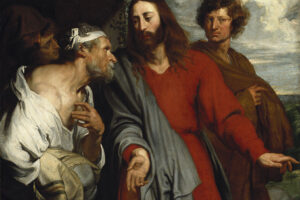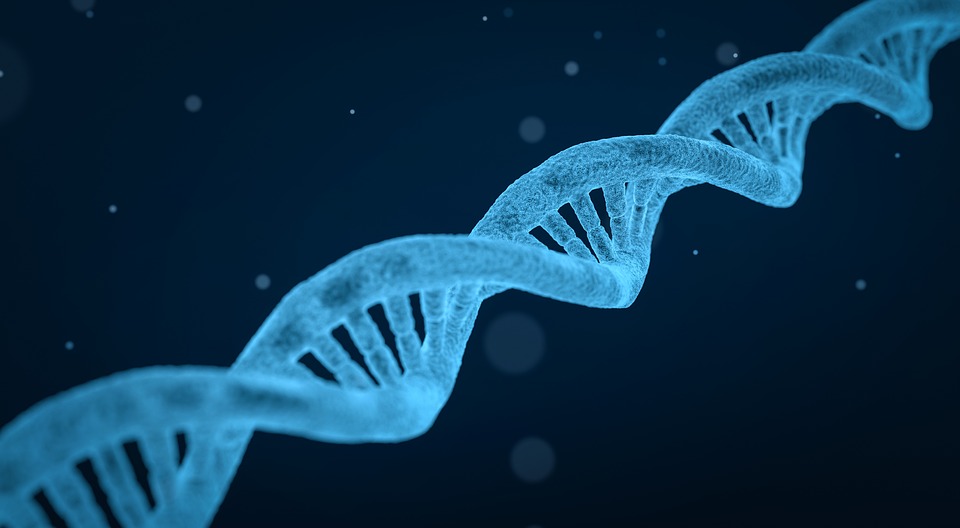The Bible’s Answer
Introduction
Adherents of Judaism claim that Jesus of Nazareth cannot be the Jewish Messiah because he is not a direct descendant of Solomon’s lineage. In Jesus’ genealogy in the Gospel of Matthew, we see that he is in fact a descendant of Solomon, however, this was only from his step-father’s side of the family, Joseph (Matthew 1:6–7, 16).
Since Jesus is Mary’s biological son (by the Holy Spirit), not Joseph’s, they point out that Jesus therefore can’t be Solomon’s descendant. They then quote the following Scriptures to support their claim that the Messiah has to be descended from Solomon:
He shall build a house for my name. He shall be my son, and I will be his father, and I will establish his royal throne in Israel for ever. (1 Chronicles 22:10)
… then I will establish your royal throne, as I covenanted with David your father, saying, ‘You shall not lack a man to rule Israel. (2 Chronicles 7:18) ¹
The idea is that since Solomon’s throne will continue forever, the Messiah must be his descendant to take his place and carry on his rule. This, however, is incorrect. To find out what was actually meant in these passages, we need to look at the original covenant God made, which was with David.
David’s Throne—Eternal; Solomon’s—Conditional
God said to David through the prophet Nathan:
Moreover, the LORD declares to you that the LORD will make you a house. 12 When your days are fulfilled and you lie down with your fathers, I will raise up your offspring after you, who shall come from your body, and I will establish his kingdom. 13 He shall build a house for my name, and I will establish the throne of his kingdom for ever. 14 I will be to him a father, and he shall be to me a son. When he commits iniquity, I will discipline him with the rod of men, with the stripes of the sons of men, 15 but my steadfast love will not depart from him, as I took it from Saul, whom I put away from before you. 16 And your house and your kingdom shall be made sure for ever before me. Your throne shall be established for ever. (2 Samuel 7:11–16)
Here, we see in verse 16 that God promised David that his house, kingdom, and throne would be made sure and established forever. This makes it clear that the Messiah has to be a descendant of David, not Solomon. Verse 13 tells us that Solomon’s throne would last forever only in the sense that he would be reigning in his father’s stead, but the throne that he is sitting upon is still David’s everlasting throne.
This is further supported by the fact that in 2 Chronicles 7:17–18, God told Solomon that his throne would be established forever, but only if he followed all of his commands, statutes, and rules, as David did:
And as for you, if you will walk before me as David your father walked, doing according to all that I have commanded you and keeping my statutes and my rules, 18 then I will establish your royal throne, as I covenanted with David your father, saying, ‘You shall not lack a man to rule Israel. (2 Chronicles 7:17–18)
God’s promise to David that his throne would be established forever in 2 Samuel 7:16 was absolute. But his promise to Solomon here was conditional. If he failed to be faithful in serving the Lord, God would cast him out of the land and forsake his house (2 Chronicles 7:19–22). This again shows that Solomon would only be continuing David’s rule, not ruling his own new kingdom.
Solomon Only Continued David’s Reign
In addition, after Solomon not only disobeyed God’s commands by marrying many foreign, pagan women, but even abandoned God himself by worshipping and serving his wives’ false gods instead, and built alters to sacrifice to them (1 Kings 11:1–8), God punished Solomon:
And the LORD was angry with Solomon, because his heart had turned away from the LORD, the God of Israel, who had appeared to him twice 10 and had commanded him concerning this thing, that he should not go after other gods. But he did not keep what the LORD commanded. 11 Therefore the LORD said to Solomon, “Since this has been your practice and you have not kept my covenant and my statutes that I have commanded you, I will surely tear the kingdom from you and will give it to your servant. 12 Yet for the sake of David your father I will not do it in your days, but I will tear it out of the hand of your son. 13 However, I will not tear away all the kingdom, but I will give one tribe to your son, for the sake of David my servant and for the sake of Jerusalem, which I have chosen. (1 Kings 11:9–13)
What’s significant about this is that as punishment for Solomon’s sins, God divided the kingdom of Israel and took away from his son, Rehoboam, all the tribes of Israel except for Judah. But the only reason why God saved one tribe for him was not so that he could keep his covenant with Solomon, since he broke the covenant, but so that he could keep his original covenant with David, who kept the covenant. This again shows that God’s ultimate promise was that king David’s throne would last forever, and that Solomon was only tasked with continuing his reign, in accordance with 2 Samuel 7:11, 16.
The Messiah Rules upon David’s Throne—Not Solomon’s
In fact, this is the reason why after the accounts of David and Solomon from 1 Samuel to 2 Chronicles, the Messianic prophecies teach that the Messiah would one day rule upon David’s throne, not Solomon’s:
Once for all I have sworn by my holiness; I will not lie to David. 36 His offspring shall endure for ever, his throne as long as the sun before me. 37 Like the moon it shall be established for ever, a faithful witness in the skies. (Psalm 89:35–37) (See also Psalm 89:3–4 & Psalm 132:11–12)
For to us a child is born, to us a son is given; and the government shall be upon his shoulder, and his name shall be called Wonderful Counsellor, Mighty God, Everlasting Father, Prince of Peace. 7 Of the increase of his government and of peace there will be no end, on the throne of David and over his kingdom, to establish it and to uphold it with justice and with righteousness from this time forth and for evermore. The zeal of the LORD of hosts will do this. (Isaiah 9:6–7) (See also Isaiah 11:1–10)
Behold, the days are coming, declares the LORD, when I will raise up for David a righteous Branch, and he shall reign as king and deal wisely, and shall execute justice and righteousness in the land. 6 In his days Judah will be saved, and Israel will dwell securely. And this is the name by which he will be called: ‘The LORD is our righteousness. (Jeremiah 23:5–6) (See also Jeremiah 33:14–18) ²
And I will set up over them one shepherd, my servant David, and he shall feed them: he shall feed them and be their shepherd. 24 And I, the LORD, will be their God, and my servant David shall be prince among them. I am the LORD; I have spoken. (Ezekiel 34:23–24) (See also Ezekiel 37:24–25)
Even the Jewish scribes and Pharisees of Jesus’ day knew that the Messiah would descend from David’s lineage, in spite of their constant opposition towards him (Matthew 22:41–42). The cumulative Scriptural evidence proves that the Messiah must be a biological descendant of David, not Solomon. Could he be a descendant of Solomon? Yes, he could, but he could also be a descendant of any of David’s other children, too.
Jesus Is a Descendent of King David
According to the Gospel of Luke, Jesus is a descendant of king David through his mother, Mary:
Jesus, when he began his ministry, was about thirty years of age, being the son (as was supposed) of Joseph, the son of Heli, … 31 the son of Melea, the son of Menna, the son of Mattatha, the son of Nathan, the son of David, … (Luke 3:23, 31) *
This is proof that Jesus is David’s biological heir. As for Matthew’s Gospel, even though Joseph is only Jesus’ step-father, Jesus is still the legal heir of David and Solomon from Joseph’s side through adoption. So the fact that Jesus is David’s biological descendant through Mary, and his legal heir through Joseph, only serves to strengthen the fact that Jesus is the Messiah; he meets the Messianic criteria of being a descendant of David.
The apostle Paul, who was a Pharisee and expert on the Old Testament Scriptures before converting to Christianity, stressed the importance that Jesus is David’s offspring in his letters:
Remember Jesus Christ, risen from the dead, the offspring of David, as preached in my gospel, 9 for which I am suffering, bound with chains as a criminal. But the word of God is not bound! (2 Timothy 2:8–9) **
Paul, a servant of Christ Jesus, called to be an apostle, set apart for the gospel of God, 2 which he promised beforehand through his prophets in the holy Scriptures, 3 concerning his Son, who was descended from David according to the flesh 4 and was declared to be the Son of God in power according to the Spirit of holiness by his resurrection from the dead, Jesus Christ our Lord, … (Romans 1:1–4)
Being an expert on the Scriptures, he knew that the Messiah had to be a descendant of David to take his throne.
Jesus—the Sinless King Who Rules on David’s Throne Forever
Unlike all the kings after David who were not capable of continuing his rule forever because of their sins, Jesus, who is the promised Messiah, was without sin, and he upheld God’s Law perfectly throughout his entire life (Matthew 5:17):
For we do not have a high priest who is unable to sympathize with our weaknesses, but one who in every respect has been tempted as we are, yet without sin. (Hebrews 4:15)
For David did not ascend into the heavens, but he himself says, “‘The Lord said to my Lord, Sit at my right hand, 35 until I make your enemies your footstool.’ 36 Let all the house of Israel therefore know for certain that God has made him both Lord and Christ, this Jesus whom you crucified. (Acts 2:34–36)
As God’s sinless Anointed One (Messiah), Jesus was the only one fit to fulfil God’s covenant promise to David. Through his innocent suffering, his atoning death on the cross, and his resurrection from the dead, Jesus saved the world from sin and its consequences, and is now seated at the right hand of God in Heaven (1 Corinthians 15:3–4; Mark 16:19), where he rules an everlasting kingdom upon David’s throne forever:
But of the Son he [the Father] says, “Your throne, O God, is for ever and ever, the sceptre of uprightness is the sceptre of your kingdom. 9 You have loved righteousness and hated wickedness; therefore God, your God, has anointed you with the oil of gladness beyond your companions. (Hebrews 1:8–9)
Everyone who draws near to God through the Lord Jesus will be saved from sin’s curse, eternal punishment, and share in his kingly reign forever in the life to come:
Consequently, he is able to save to the uttermost those who draw near to God through him, since he always lives to make intercession for them. (Hebrews 7:25)
The one who conquers, I will grant him to sit with me on my throne, as I also conquered and sat down with my Father on his throne. — Jesus Christ (Revelation 3:21)
I, Jesus, have sent my angel to testify to you about these things for the churches. I am the root and the descendant of David, the bright morning star. — Jesus Christ (Revelation 22:16)
Notes
* Joseph was most likely Heli’s son-in-law, hence, Heli would have been Mary’s father. Joseph would have been mentioned instead of Mary since Jewish genealogies were only traced through the fathers. In addition, there was no Hebrew word at the time to describe an in-law. This best explains the different genealogies presented in Matthew and Luke.3–5
** Christ is the Greek word for Messiah. When Paul said “Jesus Christ” he was saying “Jesus the Messiah”.
References
1. Was Jesus the Messiah?, JewsforJudaism, <https://jewsforjudaism.org/knowledge/articles/was-is-jesus-the-messiah>, last accessed on 3 Nov 2019
2. The Messiah would be a descendant of David, JewsforJesus, <https://jewsforjesus.org/jewish-resources/messianic-prophecy/the-messiah-would-be-a-descendant-of-david/>, last accessed on 3 Nov 2019
3. Ted M. Montgomery, Is Jesus a descendant of both David and Solomon?, TedMontgomery.com, <http://www.tedmontgomery.com/bblovrvw/emails/JesusDavidSolomon.html>, last accessed on 3 Nov 2019
4. Doug Bookman, Why Are Matthew’s and Luke’s Genealogies Different?, Christianity.com, <https://www.christianity.com/jesus/birth-of-jesus/genealogy-and-jewish-heritage/why-are-matthews-and-lukes-genealogies-different.html>, last accessed on 3 Nov 2019
5. Why are Jesus’ genealogies in Matthew and Luke so different?, GotQuestions, <https://www.gotquestions.org/Jesus-genealogy.html>, last accessed on 3 Nov 2019






